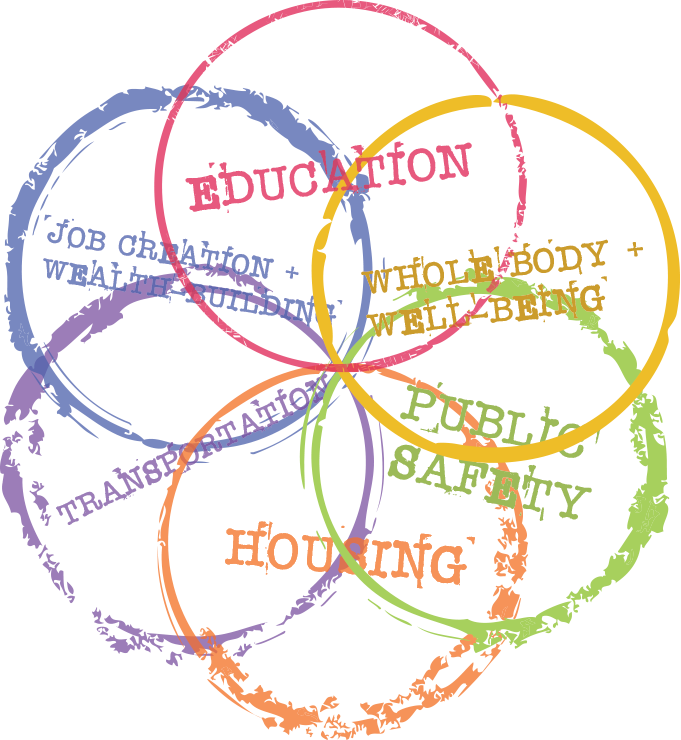RVA Has Work to Do on Education, The Foundation for Social Justice
By Michelle Saka El, Arthur L. Burton, Adrienne Cole Johson, and Tawnya Pettiford-Wates
Published in the Richmond Times-Dispatch on October 15, 2016
Education is political and powerful. Beyond classrooms, schools and institutions, knowledge gives an individual the ability to affect their destiny and impact the community and world in which they live. It is a potent and dominant factor in the level of success that a person or a community can ultimately achieve — not only related to our educational system, but also related to our daily interactions and approaches to educating one another.
Robert Fulgham, author of “All I Really Need to Know I Learned in Kindergarten,” talks about these daily actions in greater detail. He expresses what education is and where education starts — in the home and in the heart.
This book’s genius is in amplifying the significance of the simple lessons that we learn early in life — ranging from number one: share, number two: play fair, to number thirteen: watch out for traffic, look out for each other and hold hands; we are reminded of the importance of the well-being of the person as a member of the community. This is true education.
Community justice is based upon true education: The passed down knowledge of a people; their history, their practices of self-care, sustenance and community building, how to live right, how to think whole, and how to die with dignity. And this comes alongside a sincere appreciation for this approach.
Once a person begins to strive and thrive, self efficacy and the spirit of empowerment can truly move the soul — moving the soul to understanding, forgiveness, and openness in a world that may not always be as just as it is said to be. In its best sense, community justice and true education should facilitate empowerment, community care, and social cohesion among community members.
***
As community members and builders it is important for us to identify what is important and significant with regard to education. The content, the context, the approach, and the delivery. Often times we are found looking to others to define what is of value and to validate what is important. Community justice encourages us to place value on our own and to learn and teach with one another accordingly. A community that is empowered produces its academic venues, and this is a grassroots up endeavor, not vice versa.
So when we consider educational systems and institutions, it is important that we interweave community engagement and involvement throughout the process. There should be more collaboration versus telling, and more partnership versus simply reporting out.
Not only should families be involved, they should be encouraged into a welcoming and positive atmosphere that speaks to the desire for community involvement. Schools and institutions, or any venue of skills and academic learning, must be community-driven for true community justice to prevail, and while this is written in theory, it is often not the truth in practice.
Our unrooted community education system of the United States empire is not designed to incorporate the voice, input, and presence of other. This perspective of history is often slanted, the approaches are not always inclusive, and the process of learning is not always freeing.
***
One might suggest that our school systems cannot be changed because it is in conflict with community justice. Yet it is necessary for us to be the change because it is we the people who have the power, influence, and ability to do so.
It is important that we not only advocate for our youth, but also create space for them to validate themselves within the frame of the educational process. It is an empowering and transformational process that really allows children to ground themselves as important pieces of the world fabric. Likewise, it is informative for growth as involved parents, community residents, and leaders exercise that power and witness the presence of it through our youth. Only communities can change our school systems, if we are empowered with true education, because while people can be saved, empires cannot.
So Richmond, we have work to do. Virginia, we have work to do. And World, we have work to do. We are experiencing difficult times regarding freedom, justice and equity — and there is no better place to start than with education. From the concrete measures such as buildings, materials, personnel and human resources support. To the intangible measures of citizenship, character, and humanity. Our charge is to do the work — but through the lens of community justice, where diverse voices around context and content are heard, and where venues and institutions of education reflect the quality of support that all children need to live a healthy and successful life.
Our community justice film premier screening on education is this month! Please get engaged and involved and join us Oct. 29 at 2 p.m. at Virginia Union University in Wall Auditorium/Elephant Hall (1500 North Lombardy, 23220). We will move beyond the big screen into open, lively, and real conversation — all with the aim of effective community justice practices in our city.
